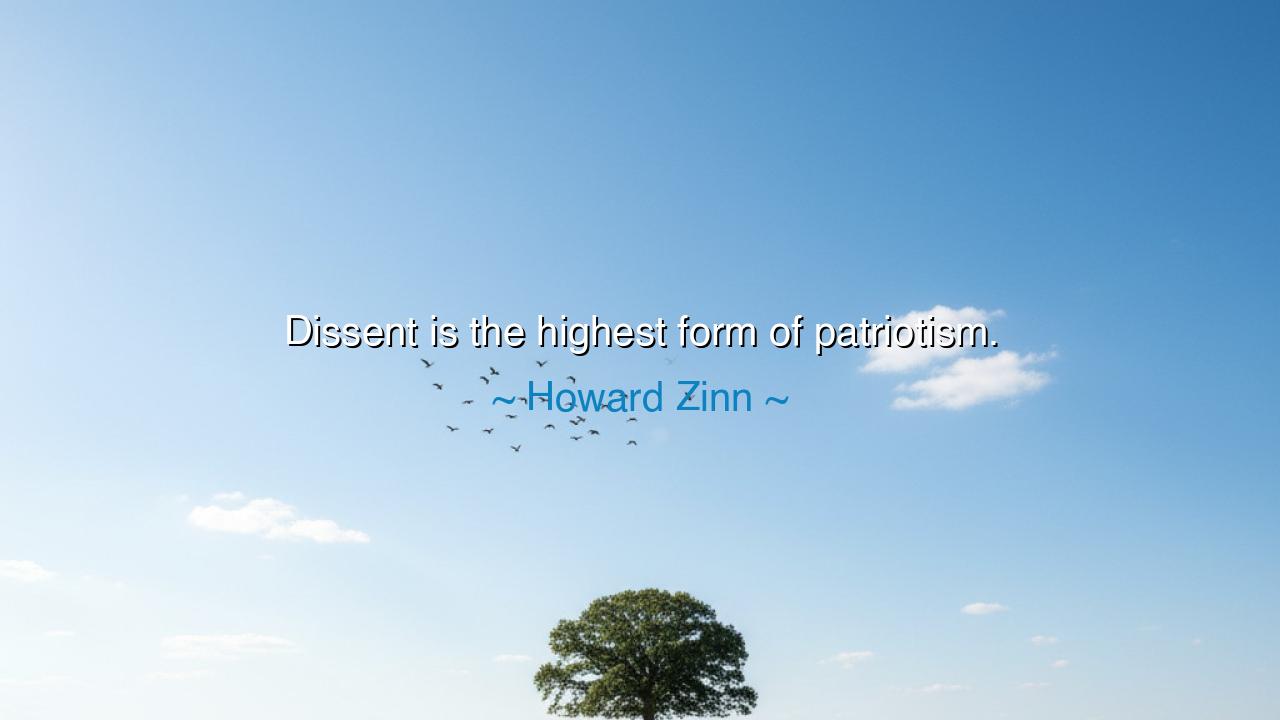
Dissent is the highest form of patriotism.






Howard Zinn, the historian who sought to give voice to the silenced and the oppressed, declared with unflinching courage: “Dissent is the highest form of patriotism.” In this bold saying, he overturned the shallow notion that patriotism is blind obedience or unquestioning loyalty. He taught instead that true patriotism is measured not by submission, but by the willingness to challenge injustice, to confront falsehood, and to hold one’s nation accountable to its noblest ideals. For love of country, if it is real, must be love strong enough to correct, not merely to praise.
The origin of these words lies in the turbulent decades of war and protest in America. Zinn, who lived through the civil rights movement and the Vietnam War, saw how often governments cloaked themselves in flags while committing injustice at home and abroad. He witnessed how dissenters—those who marched, protested, and refused to remain silent—were labeled unpatriotic. Yet Zinn knew the truth: that those who dared to dissent often loved their country more deeply than those who accepted its wrongs in silence. Thus he gave this teaching, that dissent is not betrayal but devotion of the highest order.
History bears powerful witness to this truth. Recall the voices of the American Revolution. To the British Crown, Washington, Jefferson, and Adams were rebels, traitors, dissenters. Yet their dissent birthed a nation. Their refusal to bow before injustice was not hatred of their homeland, but love so fierce it demanded liberty. So too with abolitionists who opposed slavery, suffragists who demanded the vote for women, and civil rights leaders who marched against segregation. Each was denounced in their time as unpatriotic, yet each proved to be the truest patriots of all.
Consider Martin Luther King Jr., who declared that America had given a promissory note to its people—a promise of equality and justice—that had long been dishonored. His marches and sermons were acts of dissent, yet they were rooted in love of country and faith in its capacity to become better. Though beaten and jailed, he did not abandon America; he demanded that America rise to its own creed. Such dissent is indeed the highest form of patriotism, for it sacrifices comfort and safety for the sake of truth and justice.
Zinn’s words are also a warning against false patriotism. Many believe loyalty means silence, that to question authority is to betray the nation. But silence in the face of injustice is not love—it is complicity. The tyrant thrives when the people mistake obedience for devotion. Yet dissent, even when uncomfortable, is the medicine by which the nation is healed. The patriot who raises his voice against wrong does more for his country than the flatterer who applauds its every deed.
The lesson is clear: if you love your country, dare to dissent when it strays from justice. Speak against corruption, even when the crowd shouts you down. Stand with the oppressed, even when power calls you traitor. Teach your children that patriotism is not the waving of flags alone, but the courage to speak truth to power. For a nation that silences dissent silences its own conscience, but a nation that listens to its dissenters may yet endure in freedom.
Therefore, let us carry forward Zinn’s teaching as sacred wisdom. “Dissent is the highest form of patriotism.” Do not fear to question, for it is in questioning that we preserve liberty. Do not fear to resist, for it is in resistance that justice is born. And when history looks back upon our time, let it be said that we were not flatterers of falsehood, but dissenters in the name of truth. For by dissent, we prove our love of country; by dissent, we guard its soul; by dissent, we pass to future generations a homeland purified by courage.






AAdministratorAdministrator
Welcome, honored guests. Please leave a comment, we will respond soon